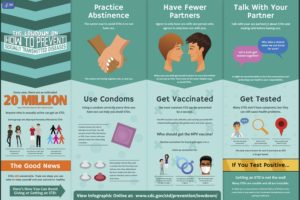Sexually transmitted diseases (STDs) are diseases passed from one person to another through intimate physical contact and sexual activity including vaginal, oral and anal sex. They can range from minor discomfort to life threatening, so it’s important to know what your plan of action is for avoiding them.
Common STDs include Gonorrhea, Chlamydia, Herpes, Human Papillomavirus (HPV) and Genital Warts. HIV and AIDS are also considered STDs. AIDS severely impacts your immune system, though people are becoming more able to live with it through modern medicine; HPV can cause further health concerns, including cervical cancer.
According to the Center for Disease Control and Prevention (CDC), STDs are very common, and in fact, they estimate 20 million new infections occur every year in the United States.
So, How Do You Prevent STDs?
STD prevention methods include:
- Abstinence
- Condom Use
- Having Fewer Sex Partners
- Mutual Monogamy
- Vaccination
Abstinence means abstaining or not having sex at all. If you are having sex, condoms should be used to prevent STDs as much as possible.
Other ways to prevent STDs, if you do have sex, include reducing the number of sexual partners you have. The fewer partners you have, the less likely you are to contract a disease.
Mutual monogamy, or to have sex with only one partner, can also be effective if both partners get tested and know that they are not infected.
Vaccinations for some STDs are also available. Vaccines are safe, effective and recommended to prevent hepatitis B and HPV. The HPV vaccine is approved for both females and males.
To learn more about what you can be doing prevent STDs, or if you believe you are at risk or may have contracted one, please call us to set up an appointment!
